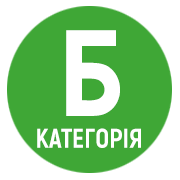CONCEPTUAL AND CATEGORICAL APPARATUS OF PROFESSIONAL LANGUAGE OF INCLUSIVE EDUCATION IN UKRAINE
DOI:
https://doi.org/10.32689/maup.philol.2024.2.5Keywords:
inclusion, inclusive education, terms, professional languageAbstract
Inclusive education should be considered a special system of educational services, the main goal of which isto ensure equal access to education for every person, regardless of special abilities, psychophysical development and individual needs. The purpose of this study is to systematize and analyze the conceptual and categorical apparatus of the professional language of inclusive education. The research was conducted on the basis of theuse of general scientific and special methods that are used in modern science, as well as the method of descriptive analysis with a review of scientific literature. The international and domestic legislation, which defines the main principles, tasks, rights and obligations of the subjects of the educational process, obligations to ensure inclusiveeducation for children and youth with special educational needs, has been singled out and analyzed. It is argued that today there is an active process of coordination and adaptation of national and international legislation to ensure all conditions for the organization of successful inclusive education. The prospects for further research in the field of the professional language of inclusive education are knowledge and understanding of the conceptual and categorical apparatus of the professional language of inclusive education, which are key to the effective organization of the educational process and the creation of a favorable environment for all students, which in turn contributes to ensuring equal opportunities in education and training inclusive society. Based on the analysis of international conventions, domestic legislation and scientific literature, the author identified the fundamental terms of inclusive education and carried out a conceptual analysis of their content. The need to systematize the terms of the professional language of inclusive education and develop specialized dictionaries is argued. This study makes a significant contribution to the development of the professional language of inclusive education, contributing to the improvement of the efficiency and quality of educational services for all participants of the educational process. Identification of key terms and their systematization allow you to create a single platform for professional communication. This, in turn, contributes to greater consistency of actions and understanding between all participants in the educational process. The use of unambiguous terms also facilitates the development and implementation of educational programs that meet the needs of all students. Thus, the study lays the groundwork for further scientific and practical developments in the field of inclusive education. The use of standardized terms helps strengthen the legal field and ensure equal opportunities for all children, regardless of their educational needs.
References
Андрійчук Н. М. Інклюзивна освіта в сучасній гуманітарній науці: понятійно-категоріальний аппарат. Науковий часопис НПУ імені М. П. Драгоманова. Серія 16: Творча особистість учителя: проблеми теорії і практики. 2016. Вип. 26. С. 3–7.
Антощак О. Інклюзивна освіта: шляхи від теорії до практики. Директор школи. 2019. № 9–10. С. 72–78.
Бойко В. О. (2012). Інклюзивна освіта: до питання визначення поняття та особливостей її реалізації. Психолого-педагогічні науки. № 4, С. 1–4.
Бугайчук А. Інклюзивна освіта в Україні: крок за кроком. Директор школи. Шкільний світ. 2019. № 3. С. 4–13.
Васильєва Г.І. Формування методичної компетентності педагогічних працівників закладів загальної середньої освіти в умовах інклюзивного середовища. Дис…канд…педагог…наук. Київ. 2021. 253 с.
Данілавічютє Е. А. Стратегії викладання в інклюзивному навчальному закладі: навчально-методичний посібник. К.: Видавнича група «А.С.К.», 2012. 287с.
Казачінер О. С. Використання методу ігротерапії у навчанні іноземної мови. Молодий вчений. 2016. № 2. С. 276–280.
Каминін І. М. Впровадження принципів інклюзивної освіти в процес навчання англійської мови в школі. URL: http://dspace.hnpu.edu.ua/handle/123456789/93.
Колупаєва А. А. Інклюзивна освіта: реалії та перспективи: Монографія. К.: «Самміт-Книга», 2009. 272 с.
Конвенція про права дитини. Редакція зі змінами, схваленими резолюцією 50/155 Генеральної Асамблеї ООН від 21 грудня 1995 року. Конвенцію ратифіковано Постановою ВР № 789-XII від 27.02.91. URL: https://zakon.rada.gov.ua/laws/show/995_021#Text.
Конвенція про права осіб з інвалідністю. Ратифікована Законом України № 1767-VI від 16.12.2009. URL: https://zakon.rada.gov.ua/laws/show/995_g71#Text.
Конституція України. Відомості Верховної Ради України (ВВР). 1996. № 30. С. 141. URL: https://zakon.rada.gov.ua/laws/show/254к/96- вр#Text.
Малишевська І. А. Інклюзивне освітнєсередовище: генеза поняття. Особлива дитина: навчання і виховання, 2016. No 3. С. 19–26.
Мігай Н. Б., Камишова Т. М. Англомовна термінологія галузі інклюзивної освіти та її однойменні одиниці. Науковий вісник Міжнародного гуманітарного університету. Сер.: Філологія. 2021. № 48, том 2. С. 9–12. DOI: https://doi.org/10.32841/2409-1154.2021.48-2.2.
Про затвердження Порядку організації інклюзивного навчання у закладах загальної середньої освіти. Постанова Кабінету міністрів України від 15.09.2021 №957. URL: https://zakon.rada.gov.ua/laws/show/957-2021-%D0%BF#Text.






